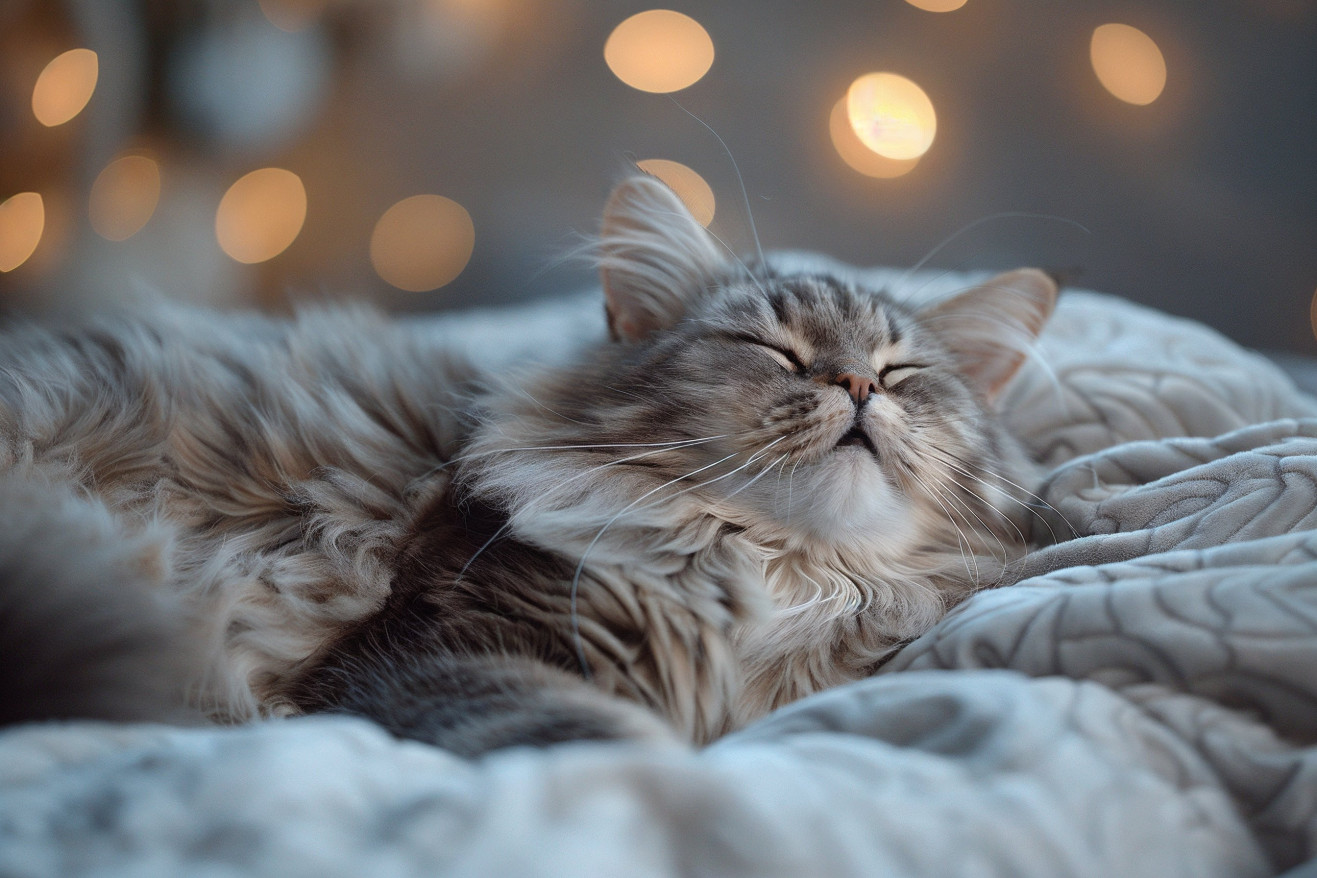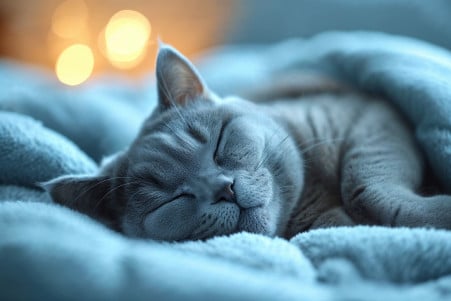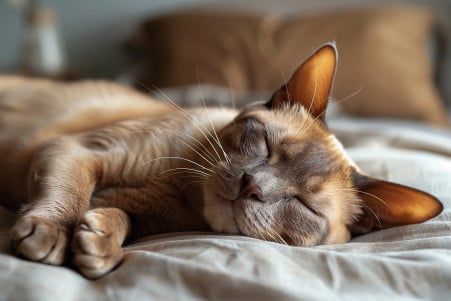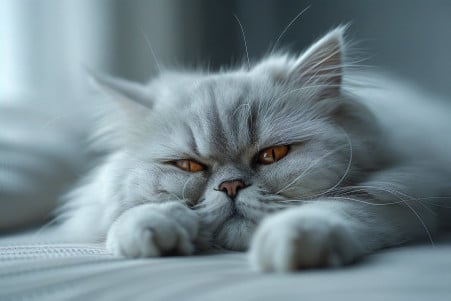Feline Nightmares: Why Do Cats Have Bad Dreams?
1 April 2024 • Updated 1 April 2024

Cats, like humans, are capable of having nightmares, but what exactly leads to bad dreams in cats? Stress, anxiety, and past trauma can all lead to nightmares in cats, and the content of their dreams likely involves themes of being chased or trying to escape from a threatening situation. While they can be distressing, nightmares are usually nothing more than a normal side effect of a cat's active mind during sleep.
To find out more about why cats have nightmares, we'll delve into studies from veterinary science, sleep research, and animal behavior. This will help us understand the potential causes of feline nightmares, how often cats have bad dreams, and what their nightmares can tell us about their cognitive abilities while they're asleep. By learning what leads to a cat's bad dream, we can gain a better understanding of their often enigmatic inner world.
Can cats have nightmares?
How to Tell If Your Cat Is Having a Nightmare
Cats display a variety of behaviors during REM sleep that could indicate they are having a nightmare. These behaviors include twitching, paw movements, vocalizations such as hissing or growling, and signs of distress, according to Purina, which cites research by Michel Jouvet. Some cats may also wake up in a panic or aggressive state after a nightmare, according to an anecdote on TheCatSite.
It is important for cat owners to be able to recognize these behaviors because they can provide valuable information about the cat’s sleep and emotional life. For example, twitching, vocalizations, and signs of distress can help cat owners determine if their pet is having a nightmare or just dreaming about hunting, according to a veterinarian on JustAnswer.
Recognizing these behaviors can also help cat owners understand their pet’s sleep patterns and determine if there are any anxiety or trauma triggers that may be causing their nightmares. This can help cat owners address these issues and make their cats feel safer when they sleep.
Causes and Triggers of Feline Nightmares
There are many things that can cause a cat to have a nightmare, including stress, anxiety, and past trauma. Catster explains that cats can dream about things that have happened to them in real life, including being chased, trying to escape from something, and frustrating interactions.
Kittens and senior cats are more likely to have nightmares because of their increased REM sleep and potential health issues. The Dodo says that kittens are more likely to have nightmares because they have more REM sleep. Meanwhile, Pettsie points out that senior cats are more likely to have nightmares if they are in pain or uncomfortable.
Environmental factors, such as changes in routine, new environments, and loud noises, can also play a role in a cat's nightmares. Knowing these potential causes can help cat owners better understand and address any issues that may be affecting their cat's sleep and overall happiness. By learning about the causes of feline nightmares, pet parents can work to make their cat's environment more soothing and comforting and help them when they seem to be having a nightmare.
How to Help a Cat After a Nightmare
If you notice that your cat seems upset after a nightmare, it’s important to help them feel safe and secure. According to advice on TheCatSite, you should never wake a cat up while they are having a nightmare because it can startle them and cause them to lash out. Instead, you should make sure that your cat has a calm, safe environment to return to and that they have a safe place to go if they need it.
In addition, you can help your cat feel more secure after a nightmare by talking to them in a soothing voice, giving them their favorite toys or blankets, and keeping their routine as normal as possible, according to a veterinarian on JustAnswer. Purina also suggests using pheromone diffusers or playing calming music to help your cat feel more relaxed. By being patient and understanding, you can help your cat feel safe and secure after a nightmare.
How Long and How Often Do Cats Have Nightmares?
Cats have shorter REM sleep cycles than humans, and since nightmares typically happen during REM sleep, this means that cats have more frequent but shorter nightmares. Purina says that cats have REM sleep and dream about their favorite activity, hunting. Meanwhile, Pettsie points out that kittens have even more REM sleep and, therefore, more frequent nightmares as they learn about the world around them.
While the length of a cat's nightmare isn't known, studies have shown that most cats' REM sleep cycles are only a few minutes long. Although nightmares are generally nothing to worry about, Purina warns that if a cat has frequent or long nightmares, it could be a sign of a problem. So, keeping an eye on how often and how long a cat has nightmares can help cat parents catch any potential issues and deal with them before they become serious.
This information about how long and how often cats have nightmares lays the groundwork for understanding whether cats can remember their nightmares, which we'll cover next.
Can Cats Remember Their Nightmares?
Although there is not much direct research on whether cats can remember their nightmares, there is some evidence that cats can remember their dreams. Cats have both short-term and long-term memory, which is similar to humans. According to Petsmont, cats have the ability to remember things long-term, especially if the memory is tied to a very good or very bad experience.
Cats also have episodic memory, which means they can remember specific details of past events, as pointed out by Popular Science. This means that their nightmares, especially if they are particularly intense or traumatic, may be remembered long-term. The Dodo explains that the brain activity of cats shows they can remember their dreams long-term.
That said, the way that they remember their dreams may not be the same as the way that humans remember things visually, and instead may be tied to other senses, such as smell and sound, as Popular Science explains. Although the details are not yet fully understood, the research suggests that cats have the ability to remember their nightmares, even if their memories don't work in the same way as human dream memories.
Conclusion: Understanding and Addressing Feline Nightmares
While research is ongoing, evidence suggests cats can experience nightmares during REM sleep. Nightmares in cats are generally harmless but can be a sign of stress, anxiety, or past traumatic experiences. Owners should learn to recognize the signs of a cat having a nightmare, such as twitching, vocalizations, and distress.
Creating a calm, familiar environment and offering comfort can help soothe a cat after a nightmare. Monitoring the frequency and duration of nightmares can also help identify potential underlying issues.


